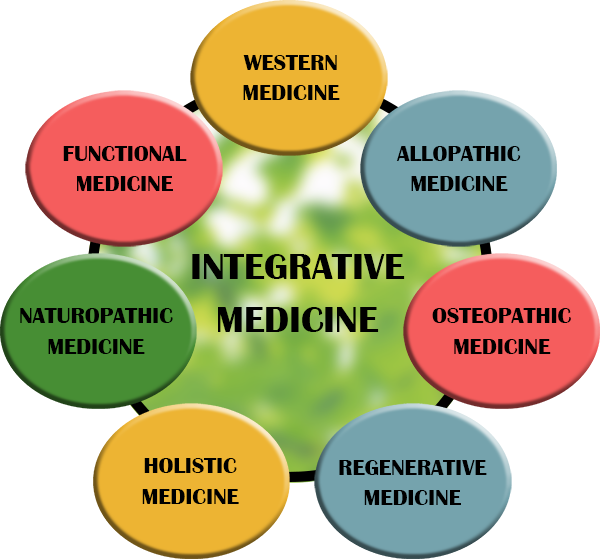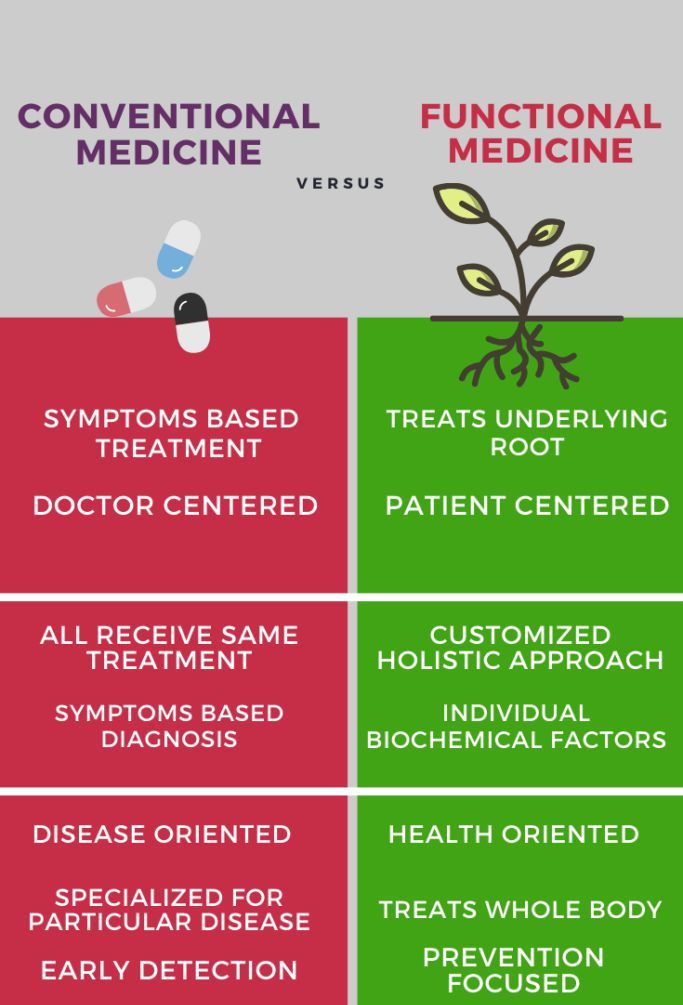Functional Medicine Explained: How It Focuses on Balance, Prevention, and Root Causes
Revealing the Recovery Methods of Functional Medicine and Holistic Medicine for Optimal Wellness
The expedition of functional and holistic medicine discloses distinctive yet intertwined pathways to health (Functional Medicine). Functional medicine looks for to reveal the underlying reasons of ailments, while all natural medicine embraces a bigger point of view of well-being that includes spiritual and emotional dimensions. Together, these approaches offer a framework for individuals to organize their wellness trips. This discussion will certainly highlight the principles, techniques, and distinctions in between these methods, welcoming more factor to consider of their mixed capacity
Recognizing Functional Medicine: Principles and Practices
Functional medicine represents a paradigm change in health care, highlighting a patient-centered technique that looks for to determine and address the origin root cause of ailment. This design integrates scientific research with scientific experience, checking out patients as special people as opposed to mere signs of a condition. Professionals of practical medicine employ a systems biology point of view, discovering the communications in between genetic, environmental, and way of living aspects that add to wellness end results.
Key principles include personalized treatment plans tailored to the individual's certain demands, fostering a collaborative connection in between client and specialist. Functional medicine additionally prioritizes preventive treatment, concentrating on way of life modifications, nutrition, and stress and anxiety administration to sustain general well-being. This technique urges people to take an active role in their health and wellness, causing boosted results and a much deeper understanding of their conditions. Inevitably, useful medicine intends to restore balance and advertise wellness, changing the health care experience into among empowerment and all natural healing.

The Holistic Medicine Technique: Integrating Mind, Body, and Spirit
While several health care strategies concentrate entirely on physical signs and symptoms, all natural medicine highlights the interconnectedness of mind, body, and spirit in the quest of suitable wellbeing. This integrative method acknowledges that psychological and emotional elements significantly influence physical wellness, leading practitioners to contemplate the entire individual during treatment. Holistic medicine uses diverse methods, including reflection, nutrition, and way of life changes, to foster equilibrium and harmony within the individual.
Practitioners typically involve people in discussions concerning their emotional states, relationships, and life experiences, acknowledging that these elements can affect overall wellness. By dealing with underlying issues and promoting self-awareness, holistic medicine intends to equip people in their recovery trip. Functional Medicine. This standard shift encourages a positive strategy to health and wellness, advocating for preventative measures and way of life adjustments as opposed to merely dealing with signs. Inevitably, holistic medicine seeks to grow a deeper link in between spirit, body, and mind, assisting in detailed health and wellbeing and personal growth

Key Differences Between Functional and Holistic Medicine
Although both functional and holistic medicine focus on extensive individual care, they vary considerably in their approaches and philosophies. Functional medicine emphasizes a systems-oriented technique, concentrating on identifying and treating the underlying sources of conditions. Practitioners commonly utilize advanced diagnostic testing and personalized therapy plans, which might consist of way of living modifications, drugs, and supplements to restore balance within the body's systems.
On the other hand, holistic medicine adopts a wider perspective, thinking about the emotional, spiritual, and environmental elements influencing an individual's health and wellness. It seeks to promote overall well-being through a combination of different therapies, such as acupuncture, meditation, and yoga exercise, together with standard therapies.

Usual Problems Dealt With by Functional and Holistic Medicine
Numerous individuals seek both functional and holistic medicine for a range of usual health conditions. These approaches are often utilized to attend to chronic diseases such as diabetes mellitus, high blood pressure, and autoimmune problems (Learn More). Functional medicine concentrates on identifying underlying reasons with comprehensive analyses, while alternative medicine stresses the interconnectedness of the spirit, body, and mind
Psychological health and wellness concerns, including anxiousness and anxiety, are also frequently treated within these frameworks, as they consider mental and psychological factors along with physical signs and symptoms. Furthermore, digestion disorders like cranky bowel disorder (IBS) and food sensitivities are usual worries, with both methods advocating for nutritional alterations and way of living modifications.
Patients may likewise turn to these methods for problems such as fatigue syndrome and fibromyalgia, where conventional therapies may fail. By integrating various recovery strategies, useful and all natural medicine aim to foster overall well-being and boost lifestyle for those affected.
Exactly how to Pick the Right Approach for Your Wellness Journey
Just how does one establish the most ideal wellness method among the myriad of options available? The choice between practical and alternative medicine needs careful consideration of individual needs and choices. One should assess their wellness goals, whether they look for signs and symptom alleviation or a much deeper understanding of underlying issues. Next, assessing one's medical history and existing problems can offer quality on which technique may be most advantageous.
Appointment with medical care experts experienced in both areas can provide important understandings. Comprehending the concepts of each technique-- practical medicine's focus on biological systems and holistic medicine's emphasis on the whole individual-- can aid in making an informed selection. Furthermore, considering personal values and comfort with treatment techniques, such as alternative treatments or dietary changes, is important. Eventually, a tailored technique that straightens with one's lifestyle and ideas will certainly foster a much more reliable wellness journey.
Frequently Asked Concerns
Are Functional and Holistic Medicine Covered by Insurance Coverage Plans?
Insurance policy protection for functional and holistic medicine varies considerably by strategy and service provider - Learn More. Some insurance coverage companies might provide partial reimbursement, while others do not cover these alternative approaches at all, calling for out-of-pocket repayments from patients
How Much Time Does Treatment Normally Take in These Methods?
Treatment period in functional and holistic medicine varies widely, typically ranging from a couple of weeks to a number of months. Variables affecting this consist of specific health conditions, therapy strategies, and the person's commitment to way of life adjustments.
Can I Integrate Functional and Holistic Medicine With Standard Treatments?
Yes, people can integrate all natural and functional medicine with traditional treatments. This integrative method might boost general health, yet consulting doctor is vital to guarantee safety and security and effectiveness in managing treatment strategies.
What Credentials Should Practitioners of These Strategies Have?
Practitioners of alternative and useful medicine need to have appropriate levels in medicine or wellness scientific researches, along with specialized training in their respective areas - Learn More. Certifications from identified companies improve reliability and assurance adherence to developed standards of care
Exist Particular Diet Plans Suggested in Holistic or functional Medicine?

In useful and holistic medicine, specific diet plans typically consist of whole foods, plant-based options, and removal diet plans customized to specific demands. Focus lies on nutrient thickness and avoiding processed foods to enhance general health and well-being.
Functional medicine looks for to reveal the underlying causes of disorders, while holistic medicine embraces a broader viewpoint of well-being that includes emotional and spiritual measurements. While practical medicine is a lot more scientifically oriented, emphasizing biological processes, all redirected here natural medicine highlights the interconnectedness of numerous life aspects. Many clients look for both functional and holistic medicine for a selection of typical health and wellness problems. Recognizing the principles of each strategy-- useful medicine's focus on organic systems and alternative medicine's focus on the whole individual-- can help in making an enlightened selection. Practitioners of alternative and practical medicine must possess pertinent degrees in medicine or health and wellness scientific researches, along with specialized training in their respective areas.